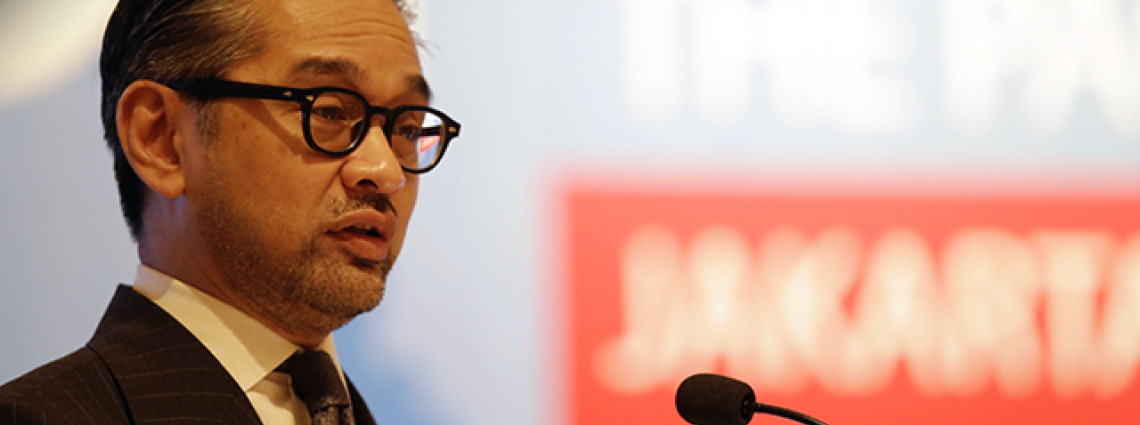Indonesia hosts two-day regional conference on the CTBT
19 May 2014
Indonesia is hosting a two-day conference from 19 to 20 May 2014 in Jakarta, Indonesia, on ways to advance the ban on nuclear tests in South-East Asia, the Pacific and the Far East region. Eighteen countries from the wider region are participating in the conference, which is supported by the European Union and the Government of Japan.
Indonesian Foreign Minister Marty Natalegawa, who opened the conference with CTBTO Executive Secretary Lassina Zerbo, told reporters that the main purpose of the conference was to encourage ratification of the Comprehensive Nuclear-Test-Ban-Treaty (CTBT) by those countries in the region which have not yet done so.
Indonesian Foreign Minister Marty Natalegawa, who opened the conference with CTBTO Executive Secretary Lassina Zerbo, told reporters that the main purpose of the conference was to encourage ratification of the Comprehensive Nuclear-Test-Ban-Treaty (CTBT) by those countries in the region which have not yet done so.
How can we assure that the strategic architecture in our region, that opens possibilities are actually taken advantage of quickly, before such a window shuts?
Adherence to the CTBT should be “seriously pursued as part of any resumed negotiations with the Democratic People’s Republic of Korea (DPRK),” Zerbo told the conference during the opening ceremony. “In particular, I call for a moratorium on nuclear testing to be at the centre of such negotiations, paving the way for eventual signature and ratification of the Treaty. In the meantime, where the DPRK is concerned, the CTBTO verification system is ready in the event of that country going ahead with its threat to conduct a further nuclear test,” Zerbo said. See his full keynote speech
(PDF).
Put quite simply, until the Treaty is legally locked in, there will always be the chance of going back to the days of nuclear testing. That, in turn, would have dire repercussions for nuclear disarmament and non-proliferation.
To enter into force, the CTBT needs to be signed and ratified by all of the countries listed in Annex 2 of the CTBT. These countries possessed nuclear power reactors or research reactors when the CTBT was negotiated. Eight of these countries have not yet ratified.
Indonesia was the most recent Annex 2 State to ratify the CTBT. Foreign Minister Marty Natalegawa formalized his country’s ratification in February 2012.
Indonesia was the most recent Annex 2 State to ratify the CTBT. Foreign Minister Marty Natalegawa formalized his country’s ratification in February 2012.
Other high-level speakers at the conference include the following:
- Nobuo Kishi
Parliamentary Senior Vice-Minister for Foreign Affairs of Japan - Jacek Bylica
European Union Special Envoy for Non-proliferation and Disarmament, European External Action Service
- Nobuyasu Abe
Director, Center for the Promotion of Disarmament and Non-Proliferation, Japan Institute of International Affairs, and former UN Under-Secretary-General for Disarmament Affairs - Ho-jin Lee
Senior Adviser, Yulchon LLC, and former ambassador of the Republic of Korea to Finland, Hungary and the United Nations - Sha Zukang
Former UN Under-Secretary-General for Economic and Social Affairs, and China's chief negotiator of the CTBT
A high-level session on “Moving towards Entry into Force and Universalization of the CTBT and the role of the CTBT in Regional and International Peace and Security” was held on the opening day of the conference. At the session, Zukang recalled the significance of Indonesia's ratification towards building momentum for the CTBT’s entry into force but warned that "the window of opportunity is closing". He called for greater support from the United States and leadership among the P5 (China, France, Russia, the United Kingdom, and the United States), to find ways to “translate promises into action”.
The CTBT is one of the best treaties for arms control and non-proliferation.
Abe called on conference participants to help ensure that their senior political leadership raise the importance of CTBT ratification with leaders of Annex 2 States. "Make sure the CTBT gets into their talking points," he said. Abe also called for increased pressure on the DPRK not to test again and for the need to secure financial resources to sustain the CTBT verification system.
Lee highlighted the significance of the performance of the CTBTO’s verification system to detect nuclear tests conducted by the DPRK in 2006, 2009 and 2013.
While reaching 170 ratifications by 2015 might be ambitious – a number of ratifications in the South-East Asia, Pacific and the Far East region could bring this number closer
The second day of the conference focused on the civil and scientific applications of the CTBT technologies, capacity building and the legal framework and support available to CTBTO Member States from the South-East Asia, Far East and Pacific region.
See CTBTO Newsroom for articles published on the conference.
See CTBTO Newsroom for articles published on the conference.
19 May 2014
